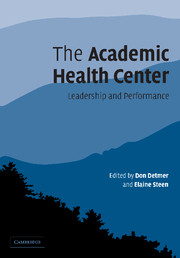Book contents
- Frontmatter
- Contents
- List of figures
- List of tables
- Foreword
- Acknowledgments
- List of contributors
- Introduction
- 1 Academic health centers: current status, future challenges
- 2 A health system for the twenty-first century
- 3 Stronger leadership in and by academic health centers
- 4 Pursuing organizational and cultural change
- 5 Managing and leveraging organizational knowledge
- 6 e-Health challenges and opportunities
- 7 Organizational challenges facing the European academic health center
- Index
- References
3 - Stronger leadership in and by academic health centers
Published online by Cambridge University Press: 12 November 2009
- Frontmatter
- Contents
- List of figures
- List of tables
- Foreword
- Acknowledgments
- List of contributors
- Introduction
- 1 Academic health centers: current status, future challenges
- 2 A health system for the twenty-first century
- 3 Stronger leadership in and by academic health centers
- 4 Pursuing organizational and cultural change
- 5 Managing and leveraging organizational knowledge
- 6 e-Health challenges and opportunities
- 7 Organizational challenges facing the European academic health center
- Index
- References
Summary
Introduction
Leaders of academic health centers (AHCs) have always experienced a wide range of formidable challenges during their tenure. AHCs are complex organizations to lead because of their multiple missions, substantial size, highly specialized products and services, diverse internal and external constituencies, and culture marked by autonomy of faculty and departments. They operate as academic, business, and (in many cases) public organizations simultaneously, in an industry that is in the midst of evolving its production modes (i.e., from cottage to manufacturing to knowledge-based). Across AHCs, financial threats abound as a result of reduced government support and declining clinical revenues.
In many cases, governance structures are being or need to be modified because governing boards do not always facilitate needed change and internal decision-making processes are not always efficient. Moreover, the career path of AHC leaders is often antithetical to the development of skills necessary for effective leadership. Further, a coherent strategy to build future leaders is lacking in most AHCs. Planning for future leadership is often equivalent to establishing a search committee when a key position becomes vacant.
An array of societal, economic, and technological forces is creating a new and as yet uncharted terrain for AHCs. Academic health center leaders must address demographic shifts, new capabilities arising from information and communications technology, and growing consumer expectations for speed and customized products and services. These changes require that organizations assume new roles, acquire new capabilities, develop new business models, and interact with both customers and staff in new ways.
- Type
- Chapter
- Information
- The Academic Health CenterLeadership and Performance, pp. 73 - 118Publisher: Cambridge University PressPrint publication year: 2005

